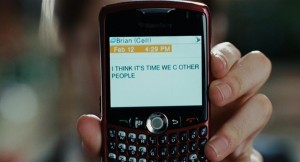After thirty years of practicing therapy, very little surprises me. When someone says, “You’re not going to believe this,” I usually hear something I have heard before, either in my office or from another therapist. So while I am not easily surprised, I am so easily disappointed by the way people choose to communicate with each other. Our tech-savvy world has created a significant lack of etiquette when it comes to basic communication. And this lack of etiquette has created enormous confusion which leads to misunderstandings. It has created a need for a primer on communication. Here are some LiM2 basic guidelines:
Our tech-savvy world has created a significant lack of etiquette when it comes to basic communication.
Texting
Rule #1: Texting should be used mostly for information sharing and short messages. “Running 5 minutes late. Save me a seat, please.” Or, “Would you mind taking the steaks out of the freezer if you get home before I do?” Maybe “Do you have time for dinner tonight?” It is also appropriate for sharing a thoughtful sentiment. “I love you. Just wanted you to know.” Or “I heard a TedTalk this morning on Positive Parenting and I thought you would love it. Here’s the link.” “Got to the hotel safely. Comfort Inn, Raleigh.” Short, sweet, and to the point. If your text requires a response, it should be able to be written with a few words. “Sure. Sounds great.” Or just a simple yes or no. DO NOT send a missive or a chapter for a novel via text.
Now I am going to break my own rule about phrasing things positively because my sense is that the times are calling for clear prohibitive messages. Here are some don’ts for texting.
Rule #2: Don’t break up via text: (Translation: Show up in person.)
 Yup. You read that correctly. Rhea and I could tell story after story about people who break-up a long-standing relationship with a text. I even had a client/male who was considering out loud whether he should send his wife a “heads up text” that he wanted to begin a conversation about divorce. WHAAT????? Legally I am not allowed to slap some sense into someone, but that is a day that I wanted to.
Yup. You read that correctly. Rhea and I could tell story after story about people who break-up a long-standing relationship with a text. I even had a client/male who was considering out loud whether he should send his wife a “heads up text” that he wanted to begin a conversation about divorce. WHAAT????? Legally I am not allowed to slap some sense into someone, but that is a day that I wanted to.
Do not text something you would not say or do in person. Your partners, spouses, and friends deserve more than a text. Tell yourself the truth. Are you just chicken? Afraid to face the disappointment, anger, or sadness head-on? Afraid of a conflict? Are you so numb to the consequences of what your actions might create that you have forgotten the need for a human touch? Just don’t do it; it is an example of a true lack of respect and consideration.
Rule #3: Don’t begin a dating relationship via text: (Translation: Make eye contact or at least talk on the phone.)
Too much can be lost in translation. You need to see a new person’s eyes, hear the tone of voice, even hear their laughter to begin to understand a person, to begin to develop some intimacy. Texting can produce a false sense of familiarity, of closeness that can later lead to devastating misunderstandings. If you think you might start dating someone, save the texts for later. And refer back to the first rule of texting.
Texting can produce a false sense of familiarity, of closeness that can lead to devastating misunderstandings.
Rule #4: Don’t apologize via text: (Translation: Put on your grown-up panties and show up.)
Here is one of my favorite quotes about apologies.
“A stiff apology is a second insult….The injured party does not want to be compensated because he has been done wrong. He wants to be healed because he has been hurt.” Gilbert K. Chesterton
 A bad apology makes a wound deeper. Texting an apology is always a bad apology. If you cannot be there in person, at least pick up the phone and make a call. If you have to, leave a message. The message not only can deliver your apology, but the message should say something like, “I want to apologize to you face to face. Let me set up a time to speak with you in person.” An email could follow if face to face time is difficult. But an apology should always feel personal.
A bad apology makes a wound deeper. Texting an apology is always a bad apology. If you cannot be there in person, at least pick up the phone and make a call. If you have to, leave a message. The message not only can deliver your apology, but the message should say something like, “I want to apologize to you face to face. Let me set up a time to speak with you in person.” An email could follow if face to face time is difficult. But an apology should always feel personal.
Rule #5: Don’t bombard someone with repeated texts: (Translation: Learn to be patient.)
If someone doesn’t respond, give them some time. Perhaps, like me, they do not stay close to their phone during the work day. If it needs immediate attention, have another way to contact the person. Otherwise, leave it alone. Take a chill pill. Learn to wait.
Rule #6: Careful how much you parent via text: (Translation: Look your teen in the eyes often and intently.)
We all know that parents and teens use text as a regular means of communication. Don’t be fooled into thinking that this passes for real and effective communication. When you cannot hear each other’s voice, too much can get lost in translation. (yes, you have read that before!) If your teen is changing plans, tell them you need to have a conversation about it. Don’t negotiate it over a text. I often say to parents, “Good parenting is not efficient.” In other words, being a good parent will take time and effort. Insisting on speaking and seeing each other is a great rule. Not yelling up or down the stairs or from another room is a good rule of thumb, too. Texting is easy, but it is not often the best choice.
Good parenting is not efficient.
Some other general LiM2 suggestions:
Keep the dinner table device free.
 With cell phones and tablets being as common on the dinner table as forks and knives, having substantive conversation can be difficult. Make your meal time a “device-free” zone. All phones and tablets off the table and out of sight and reach. There is nothing that cannot wait 30 minutes. My husband and I regularly notice how many people are out to dinner, spending most of the time looking at their phones instead of each other. Eye contact seems to be a thing of the past. Conversation seems so very difficult. Begin practicing at home. If you have become so remedial regarding conversation that you aren’t sure how to speak and listen, try a few conversation starters. “What was the funniest thing that happened to you today?” Or “What one thing would you want to change about today?” “How did you make the world a better place today?”
With cell phones and tablets being as common on the dinner table as forks and knives, having substantive conversation can be difficult. Make your meal time a “device-free” zone. All phones and tablets off the table and out of sight and reach. There is nothing that cannot wait 30 minutes. My husband and I regularly notice how many people are out to dinner, spending most of the time looking at their phones instead of each other. Eye contact seems to be a thing of the past. Conversation seems so very difficult. Begin practicing at home. If you have become so remedial regarding conversation that you aren’t sure how to speak and listen, try a few conversation starters. “What was the funniest thing that happened to you today?” Or “What one thing would you want to change about today?” “How did you make the world a better place today?”
Say please, thank you, and forgive me.
 There is an old-ish bestselling book entitled, Everything You Need To Know You Learned In Kindergarten. Hopefully, you learned these basic rules of etiquette for relationships. Say please; this one seems easiest. Just add a please to your requests.
There is an old-ish bestselling book entitled, Everything You Need To Know You Learned In Kindergarten. Hopefully, you learned these basic rules of etiquette for relationships. Say please; this one seems easiest. Just add a please to your requests.
Thank you is a little harder. It requires a bit more attentiveness and also humility. Thank you for helping me with that. It mattered. Thank you for all you do to help me day to day. Thank you for covering for me this morning. Make your thank you specific. What specifically did this person do that helped you or mattered to you? “Thank you for watching the kids this morning. It allowed me to go to the gym and I felt better all day.” “Thank you for loaning me the money last week. I was able to pay that bill on time and it saved me $25 late fee.”
I have a friend who writes the best thank you notes ever. Why are they so wonderful? Because she notices EVERYTHING. She says things like, “When I walked in and smelled the delicious meal you were cooking my mouth started to water. And then I saw fresh flowers on the table and beautiful napkins and I knew I was in for a special evening.” I feel thanked when I get her notes. So practice writing hand-written thank you notes. It is almost a lost art that need not be lost.
Saying, “Please forgive me,” is the most difficult common courtesy. It requires the greatest amount of humility. “I know I hurt you and I need your forgiveness. This is what I am going to do differently to repair this hurt.” It can make a world of difference, in our own insides and with those we have injured. It is a life skill that should be learned young and constantly honed.
Saying, “Please forgive me,” is a life skill that should be learned young and constantly honed.
We can do this, Friends. We can be the ones who communicate with care and become role models for those who don’t know how or just won’t do it. Treat the world to your best, to your highest level of communication, Because it makes life more marvelous!
Amy


Love it as always, Amy. Would love to do another retreat with you. What are your plans for next year?